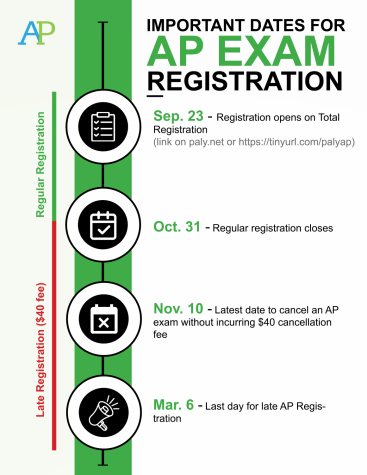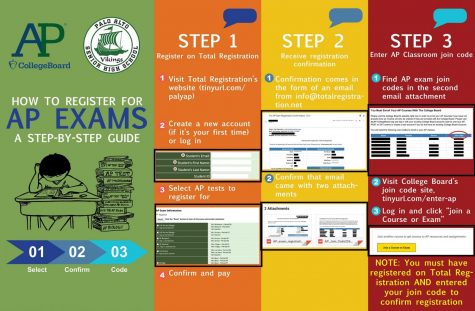College Board introduces new AP changes
October 3, 2019
Students and teachers have mixed reactions to the College Board’s new AP Registration policies, including an earlier registration deadline for students and the new AP Classroom system.
Despite the College Board’s claims about potential benefits of the changes, some students believe that the new policies only reflect the College Board’s greed.
“Although the process is a bit more involved than last year, what I’m really not enthused about is the College Board’s early deadline,” senior Neil Kapoor said. “It makes me question whether the College Board’s true mission is education and suiting students’ needs, or simply to make a quick buck when they can since they have a monopoly over standardized subject testing.”

Two main changes have resulted from the College Board’s new policies. First, Paly has changed its AP registration deadlines to reflect the earlier College Board deadlines. Secondly, Paly also requires students to register through AP Classroom (via a join code) which offers supplementary practice problems and progress benchmarks for teachers.
For the first change, fall registration, the College Board moved previous years’ March registration deadline to November. This change prompted many schools, including Paly, to set their own deadlines in October.
According to the College Board, a pilot program with the fall registration date saw higher registration rates as well as higher passing rates, presumably attributed to earlier student commitment and a longer period of time to study.
Multiple AP teachers at Paly do not believe that an earlier registration date will affect Paly registration rates, as nearly all students at Paly decide to take AP exams after completing a year of an AP class.
“I assume registration rates will be comparable, and I assume performance will be comparable,” AP U.S. History teacher Jack Bungarden said. “The new deadlines won’t really change much, at least not at Paly.”
For seniors, most will not know which college they will be attending until spring, and as a result of the new changes they must now register early and either cancel the tests or register late, incurring a $40 fine either way.

“As a senior, under the old registration deadline in the spring, I could decide which AP tests to take based on whether the college I might be going to would accept the AP credit, resulting in the College Board losing revenue on a exam for an AP class I was taking,” Kapoor said. “Since I don’t know what college I’m going to yet, I’m signing up for all the AP exams that I’m taking the class for, which is costing me hundreds of dollars more.”
The second change, AP Classroom, is a new online platform that offers students previously administered AP questions for practice. Educators can use the questions to create custom progress checks for students, or can choose to use a pre-made test from the College Board.
Teachers across multiple departments have found the system helpful, including AP Spanish teacher Pilar Badillo Novas and AP Physics teacher Gul Eris.
“So far it looks like a great system,” Eris said. “It gives you additional problems, which translates to more practice for the AP test.”
With these progress checks, AP Classroom is able to build a “Progress Dashboard” for teachers, who can then see which areas the class is struggling in. Data from each class can also be summarized and sent to school districts, allowing district officials to holistically evaluate the overall progress of students in AP courses.
The introduction of AP Classroom is not without its downsides. Upon joining a class in AP Classroom, students will see that they “are registered” for an AP exam for the class subject, even though just joining the class does not mean that they are actually signed up. AP exam registration is only finalized when students sign up and pay through Total Registration in addition to joining the AP Classroom link. Students who are still missing AP Classroom join codes after registering through Total Registration can find a full list of join codes in the confirmation email from Total Registration.
Despite the College Board’s claims of potential benefits offered by the changes, some teachers, such as AP Seminar teacher Lucy Filppu, remain skeptical about their intentions.
“We are one of the higher-performing school districts in the country,” Filppu said when asked whether she thought the changes would benefit students at Paly. “We are the bellwether of trends in public school education and the College Board. So when [College Board CEO] David Coleman himself can come explain to me the metrics and context through which we have to sign up early, and ask our kids for even more money, more signups and more commitments, I can give you a better answer.”









